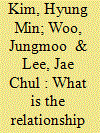|
|
|
Sort Order |
|
|
|
Items / Page
|
|
|
|
|
|
|
| Srl | Item |
| 1 |
ID:
154846


|
|
|
|
|
| Summary/Abstract |
The literature on civil war onset focuses on the effect of oil on domestic actors but relatively little suggests its effect on external actors who can intervene in an oil-producing state, although most revenues of oil-producing states are generated by their oil export to other states. This article advances a theory of oil export, external prewar support for the government, and civil war onset. In the international oil market, although oil is a primary energy source in most states, there are few oil exporters. This implies that costs of breaking an oil trade tie are greater for an oil-importing state vis-à-vis an oil-exporting state and, thus, oil-importing states are likely to have concerns about oil-exporting states’ political instability that can cause civil conflict onset and break their oil trade ties. I hypothesize that a state’s oil export increases the likelihood of external prewar support for its government. However, because oil-exporting states are likely to conceal the information about their oil export to prevent public grievances against the distribution of oil revenues and their governments’ incompetence in oil export, rebels are less likely to have complete information about oil export. The secrecy of oil export hinders finding a mutually acceptable bargaining range between the government and rebels, and increases the likelihood of civil conflict onset in oil-exporting states without external support for the government. I measure each state’s oil export using network analysis, and test these hypotheses using logit models. Empirical results support the hypotheses.
|
|
|
|
|
|
|
|
|
|
|
|
|
|
|
|
| 2 |
ID:
174829


|
|
|
|
|
| Summary/Abstract |
Despite the importance of alliances in international politics, little is known about how they theoretically and empirically affect militarized conflicts and vice versa. This study aims to examine the reciprocal relationship between alliances and militarized conflicts. The literature has focused only on the effects of alliances on militarized conflicts without paying much attention to the simultaneous causation between them. Thus, previous studies have not consistently revealed a relationship between alliances and conflict. Moreover, they are limited due to the use of dichotomous measures of shared alliance ties. Using a continuous measure of alliance ties, this study clearly demonstrates that shared alliance ties can be effective in reducing the likelihood of militarized conflicts. In addition, this study finds that there is a reciprocal relationship between shared alliances and militarized conflicts. It finds that militarized conflicts tend to decrease the level of shared alliance ties. Then, this study argues that alliance might be added to the next element behind the Kantian tripod as a salient factor that reduces militarized conflict. Finally, this study points to insights to be gained from the findings and suggests some policy implications.
|
|
|
|
|
|
|
|
|
|
|
|
|
|
|
|
|
|
|
|
|